

The Jenny Lind private railroad car is the first specifically outfitted private railway coach. It was used on Jenny Lind's singing tour of the United States. [upper-alpha 1] [upper-alpha 2] [upper-alpha 3]


The Jenny Lind private railroad car is the first specifically outfitted private railway coach. It was used on Jenny Lind's singing tour of the United States. [upper-alpha 1] [upper-alpha 2] [upper-alpha 3]
The idea of a private railroad car came out of need. P. T. Barnum brought the well known soprano singer Jenny Lind to America from Sweden for a singing concert performance tour. He did much advance publicity even before she arrived in the United States, under the Nom des artes of the "Swedish Nightingale." Thousands of people followed her wherever she went. [4] The newspapers coined the term "Lind mania" because of all the crowds that gather around her. [5] She and her husband were much annoyed by the many disrespectful interviewers that wanted to know all about the newly wed couple. [6] To solve the problem Barnum designed a special railroad car for Jenny's comfort so she could tour the nation and escape the crowds of people that wanted to speak to her. [7] The first private railroad car ever made was then born for Jenny Lind and her 1850-52 concert tour across the United States. [8] [9] [10]
Barnum first purchased a normal passenger railroad car and had all of its seats removed to be remodeled for comfort as she requested into a "parlor car." [11] Then he had it specially designed as a private living quarters in a drawing-room style with chairs, tables, and parlor style furniture that she and her husband could temporarily live in while traveling. [12] This way then she was able to travel on her singing performance tour from city to city privately without the intrusion of interviewers. [13] Lind was the first person to travel in this unusual method. [14] The private railroad car concept attracted much attention with those of up-scale expensive tastes. The wealthy then mimicked that method of travel and made their own personal private railroad coaches. The concept however was slow in developing. When it did take hold in society it eventually took further form as deluxe palace cars and dining cars. [6] It also developed into the luxury Pullman chair car. [11]

Phineas Taylor Barnum was an American showman, businessman, and politician, remembered for promoting celebrated hoaxes and founding the Barnum & Bailey Circus (1871–2017) with James Anthony Bailey. He was also an author, publisher, and philanthropist, though he said of himself: "I am a showman by profession ... and all the gilding shall make nothing else of me." According to his critics, his personal aim was "to put money in his own coffers". He is widely credited with coining the adage "There's a sucker born every minute", although no evidence has been collected of him saying this.

Johanna Maria "Jenny" Lind was a Swedish opera singer, often called the "Swedish Nightingale". One of the most highly regarded singers of the 19th century, she performed in soprano roles in opera in Sweden and across Europe, and undertook an extraordinarily popular concert tour of the United States beginning in 1850. She was a member of the Royal Swedish Academy of Music from 1840.
Barnum is an American musical with a book by Mark Bramble, lyrics by Michael Stewart, and music by Cy Coleman. It is based on the life of showman P. T. Barnum, covering the period from 1835 through 1880 in America and major cities of the world where Barnum took his performing companies. The production combines elements of traditional musical theater with the spectacle of the circus. The characters include jugglers, trapeze artists and clowns, as well as such real-life personalities as Jenny Lind and General Tom Thumb.

Elizabeth Taylor Greenfield, dubbed "The Black Swan", was an American singer considered the best-known black concert artist of her time. She was lauded by James M. Trotter for her "remarkably sweet tones and wide vocal compass".
Chickering & Sons was an American piano manufacturer located in Boston, Massachusetts. The company was founded in 1823 by Jonas Chickering and James Stewart, but the partnership dissolved four years later. By 1830 Jonas Chickering became partners with John Mackay, manufacturing pianos as "Chickering & Company", and later "Chickering & Mackays" until the senior Mackay's death in 1841, and reorganized as "Chickering & Sons" in 1853. Chickering pianos continued to be made until 1983.

A private railroad car, private railway coach, private car, or private varnish is a railroad passenger car either originally built or later converted for service as a business car for private individuals. A private car could be added to the make-up of a train or pulled by a private locomotive, providing privacy for its passengers. They were used by railroad officials and dignitaries as business cars, and wealthy individuals for travel and entertainment, especially in the United States. They were sometimes used by politicians in "whistle stop campaigns". Pay cars with less opulent sleeping and dining facilities were used by a paymaster and assistants to transport and disburse cash wages to railway employees in remote locations without banking facilities.
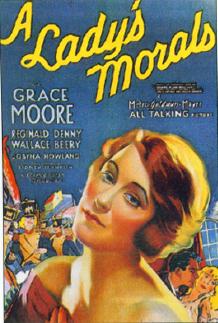
A Lady's Morals is a 1930 American pre-Code film offering a highly fictionalized account of opera singer Jenny Lind. The movie features Grace Moore as Lind, Reginald Denny as a lover, and Wallace Beery as P. T. Barnum. The film contains some opera arias by Moore and was directed by Sidney Franklin.
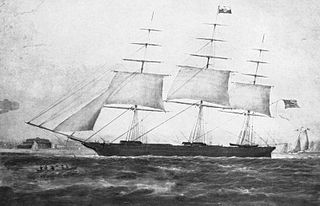
USS Nightingale was originally the tea clipper and slave ship Nightingale, launched in 1851. USS Saratoga captured her off Africa in 1861; the United States Navy then purchased her.

The first theatre in New York City to bear the name The Winter Garden Theatre had a brief but important seventeen-year history as one of New York's premier showcases for a wide range of theatrical fare, from variety shows to extravagant productions of the works of Shakespeare. Initially known as Tripler's Hall or Metropolitan Hall, it burned down in 1854 and was rebuilt as The New York Theatre. Although it burned to the ground several times, it rose from the ashes under different managers, bearing various names, to become known as one of the most important theatres in New York history.
Rebecca Sjöwall is an American opera singer and recording artist.

The Jenny Lind Tower is a stone tower located in North Truro, Massachusetts. It is named after the 19th-century opera singer Jenny Lind, who is rumored to have climbed the tower when it was located in Boston to prevent a riot among people who were unable to attend her concert. It is located roughly between the Highland Light lighthouse and North Truro Air Force Station. It is seventy feet tall.
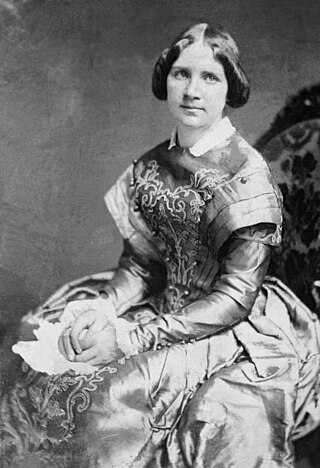
The Swedish soprano Jenny Lind, often known as the "Swedish Nightingale", was one of the most highly regarded singers of the 19th century. At the height of her fame she was persuaded by the showman P. T. Barnum to undertake a long tour of the United States. The tour began in September 1850 and continued to May 1852. Barnum's advance publicity made Lind a celebrity even before she arrived in the U.S., and tickets for her first concerts were in such demand that Barnum sold them by auction. The tour provoked a popular furore dubbed "Lind Mania" by the local press, and raised large sums of money for both Lind and Barnum. Lind donated her profits to her favoured charities, principally the endowment of free schools in her native Sweden.
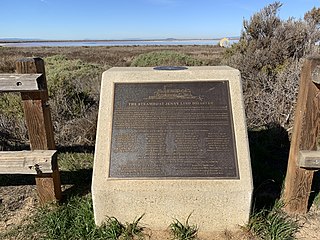
The steamboat Jenny Lind was a ferry that exploded in San Francisco Bay on April 11, 1853 while on course to San Francisco from Alviso, California, killing many residents of Alviso and San Jose. The boiler exploded as the steamboat passed the Redwood City inlet, minutes after dinner was called for the passengers. The worst of the casualties were among the women and children who were seated first at dinner. At least 31 people were killed.

The Greatest Showman is a 2017 American biographical musical drama film directed by Michael Gracey in his directorial debut, written by Jenny Bicks and Bill Condon and starring Hugh Jackman, Zac Efron, Michelle Williams, Rebecca Ferguson, and Zendaya. Featuring nine original songs from Benj Pasek and Justin Paul, the film is based on the story and life of P.T. Barnum, a famous showman and entertainer, and his creation of the Barnum & Bailey Circus and the lives of its star attractions.

John Nicholas Genin was a New York City hatter who reached national prominence in the 1850s. Like P.T. Barnum, his neighbor on Broadway, Genin had a remarkable knack for using publicity to boost his business. In 1850, at Barnum's urging, Genin made the winning auction bid of $225 for the first seat sold for the sensational cross-country tour by the singer Jenny Lind, the Swedish Nightingale, and reaped the tremendous publicity that followed. Every important newspaper in the country reported Genin's bid. Barnum wrote in his "Struggles and Triumphs" (1865) that "John N. Genin, the hatter, laid the foundation of his fortune" with that purchase. Throughout the country, men and women took off their hats to check whether they were wearing "a Genin".
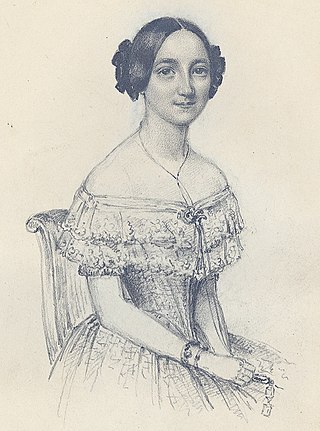
Wilhelmina ("Mina") Christina Fundin was a Swedish operatic soprano who sang at the Royal Swedish Opera without interruption for 30 years. In the mid-1800s, she was considered to be one of the opera's most talented performers.
Elma Charlotta Ström, was a Swedish opera singer.
Renee Brna is an American actress and singer. Brna is best known as Meg in the 1st national Broadway tour of Little Women the musical starring Maureen McGovern with Autumn Hurlbert as Beth, Katie Fisher as Jo and Gwen Hollander as Amy. She went on to understudy the leading role of Young Alex/Aaron Ashbrook and Young Thomas Ledbury in the 2007 London transfer to Broadway Coram Boy at the Imperial Theatre. Under the direction of Melly Still the production garnered six Tony Award nominations.
My Nightingale Is Singing is a children's book written by Astrid Lindgren.

Giovanni Battista Belletti was an Italian operatic baritone. He appeared in operas in Italy, Stockholm, London and Paris, and supported Jenny Lind in her tour of America.